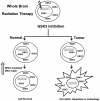Emerging roles of glycogen synthase kinase 3 in the treatment of brain tumors
- PMID: 22275880
- PMCID: PMC3223722
- DOI: 10.3389/fnmol.2011.00047
Emerging roles of glycogen synthase kinase 3 in the treatment of brain tumors
Abstract
The constitutively active protein glycogen synthase kinase 3 (GSK3), a serine/threonine kinase, acts paradoxically as a tumor suppressor in some cancers while potentiates growth in others. Deciphering what governs its actions is vital for understanding many pathological conditions, including brain cancer. What are seemingly disparate roles of GSK3 stems from the complex regulation of many cellular functions by GSK3. This review focuses on the regulation of GSK3, its role in survival, apoptosis and DNA damage, and finally its potential therapeutic impact in brain cancer. A thorough understanding of this versatile protein is critical for improving the outcome of various diseases, especially cancer.
Keywords: DNA damage; NFκB; apoptosis and autophagy; brain cancer; epidermal growth factor receptor; glycogen synthase kinase 3; lithium; neuroprotection.
Figures



References
-
- Adler J. T., Cook M., Luo Y., Pitt S. C., Ju J., Li W., Shen B., Kunnimalaiyaan M., Chen H. (2009). Tautomycetin and tautomycin suppress the growth of medullary thyroid cancer cells via inhibition of glycogen synthase kinase-3beta. Mol. Cancer Ther. 8, 914–92010.1158/1535-7163.MCT-08-0712 - DOI - PMC - PubMed
LinkOut - more resources
Full Text Sources
Research Materials

